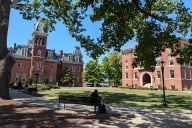You have /5 articles left.
Sign up for a free account or log in.
The American Bar Association is closer to deciding whether it will continue to require that accredited law schools offer tenure-like conditions for full-time teaching faculty, and there isn't as much support now as there has been in the past for ending the requirement.
Internal and external debate on the matter goes back at least a decade, with those in favor of continued tenure for law professors saying it anchors academic freedom and prevents the hollowing out of the professoriate though the widespread hiring of contingent faculty. Those opposed argue tenure can create a lazy professoriate and that personnel decisions should be left to institutions.
An ABA standards review committee formally began to review accreditation standards related to “security of position” for law faculty, among other standards, several years ago. (ABA defines security of position as an arrangement “reasonably similar to tenure [and which] includes a separate tenure track or a program of renewable long-term contracts.”)
This month, the committee decided on four standards options to forward to the ABA’s Council of the Section of the Legal Education and Admissions to the Bar for consideration. All four proposals mandate that schools hire competent faculty and ensure academic freedom, but vary in their requirements for tenure.
In the option the committee slightly preferred, law schools would continue to have to provide security of position to full-time teaching faculty, but also would have to have offer some form of job security to all other full-time faculty – including clinical professors and legal writing professors. Schools would retain the right to determine which groups or individuals get which kinds of security of position, however, such as long-term contracts or tenure.
Another option is nearly identical to the current standard, which widely has been interpreted to require security of position comparable to tenure for all full-time teaching faculty – but not clinical faculty or legal writing instructors.
A third option would require law schools to offer all full-time faculty the same securities of position, and final option would eliminate any security of position requirement from accrediting standards.
The elimination of the requirement seemed to be gaining ground among committee members in 2010, when they drafted a report calling such requirements “intrusive mandates” that overstepped the function of an accrediting body. But the council never adopted their recommendations amid widespread criticism from law professors, and the committee went back to work on drafting more options.
It took so long to draft the new tenure standards "because it is an important issue and merited the careful deliberation and decision-making it received," said Jeffrey E. Lewis, committee chair and dean emeritus and professor of law at Saint Louis University's School of Law.
The council will select one or more new standards options to put out for public comment in August, said Barry Currier, managing director of accreditation and legal education at ABA. The earliest it could adopt a new standard would be at their meeting in December.
Michael Olivas, a professor law at the University of Houston and a past president of the Association of American Law Schools, has been an outspoken supporter of continued tenure for law professors. In a perfect world, he said, extending tenure to all faculty, including full-time clinical faculty, would be the best option. But because tenure for clinical faculty could lead to the hiring of less faculty, given the impermanent nature of some clinics, Olivas said he's previously supported tenure for non-clinical faculty. But, he noted, it's clinical law professors who could most benefit from the protections of tenure, given the at-times unpopular and pro-bono nature of their work.
In the future, he said, "We should be adding protections, not taking them away."
Although Olivas said he's been accused of "featherbedding" for law faculty, he said tenure is crucial for faculty to maintain academic freedom, not cushy contracts. And tenure isn't foolproof; rather, it means professors are entitled to due process upon being fired and that the burden of proof falls on the institution.
Plus, he added, by participating in multiple service functions, "Most good faculty are so much more than the sum of their parts." Contingent faculty paid by the course can't be expected to contribute to institutions, in speeches to the pre-law clubs on weekday nights, for example, to the same extent, he said.
David Van Zandt, president of the New School and former dean of Northwestern University's law school, led the fight against tenure requirement for accreditation several years ago. "Sometimes people portray this as an attack on tenure," he said in 2007. "The real issue is whether or not you're required to have tenure by an outside body such as the ABA. Not that we don't want to have that institution."
Traveling this week, he could not be reached for comment.









